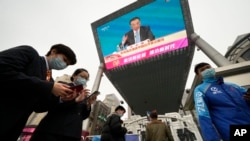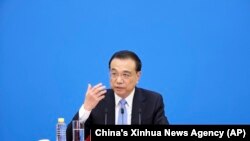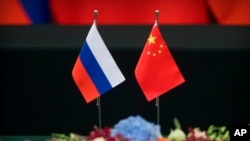NEW DELHI — Chinese Premier Li Keqiang on Friday said the U.S. and China should not “close” a cultural door between the countries as economic sanctions against neighboring Russia intensify.
“Since the two sides opened up the door to each other [50 years ago], they should not close it, let alone decouple,” Li said, referring to the 50th anniversary of diplomatic relations between the U.S. and China that started with the 1972 trip to Beijing by then-U.S. President Richard Nixon.
Echoing several conciliatory statements by Chinese leaders since Russia’s late-February invasion of Ukraine, Li accepted that Washington and Beijing have different perceptions of the crisis unfolding in eastern Europe.
“We believe cooperation should be the mainstream because world peace and development are dependent on that,” Li told reporters at the conclusion of an annual session of parliament. “Even if we are market competitors in economic and trade fronts, that should be benign and equal.”
Chinese President Xi Jinping on March 8 said his country is ready to “work actively” with the international community to resolve the conflict in Ukraine.
Passing an olive branch or protecting interests?
Some observers, however, say Beijing may be making the overtures for financial and political reasons.
“I think President Xi and the Chinese leadership are a little bit unsettled by what they’re seeing in Ukraine,” Central Intelligence Agency director William Burns testified to U.S. lawmakers recently. “They did not anticipate the significant difficulties the Russians were going to run into.”
Burns said China was also concerned about the geopolitical impact of the Russian invasion, including “by the way in which [Russian President] Vladimir Putin has driven Europeans and Americans much closer together.”
Some analysts say Beijing is trying to buy time until it is able to come up with the appropriate policy response to the changing situation. Though the sanctions target Russian trade, they will have wide-ranging impact on Chinese companies and banks that deal with Russian entities.
“China does not want to offend the West at this stage. But it is unlikely to change its long-term approach towards the U.S.,” Alexander Sandkamp, assistant professor and an expert on Chinese economy at Kiel University in Germany, told VOA.
Chinese officials think that there will be no let-up in fierce economic competition and even diplomatic friction with the U.S., sources said. But they also see sufficient space for cooperation because the world’s two largest economies would try to complement each other in business and other spheres.
Scott Kennedy, senior adviser and trustee chair in Chinese business and economics at the Center for Strategic and International Studies, said it would be wrong to think China is changing its strategy towards the U.S. at this stage.
“While Beijing has tried to separate itself from the most brutal consequences of Russia’s invasion, it has not joined the ranks of the Western alliance in outright opposition to the invasion itself,” he said.
“China still believes that Russia has legitimate security concerns that have not been addressed,” he added. “It is still collaborating with Russia in spreading disinformation, and it is still strongly opposed to Western sanctions against Russia. Until it adjusts in these areas, talk of Beijing adjusting its stance towards the United States would be mere speculation.”




















